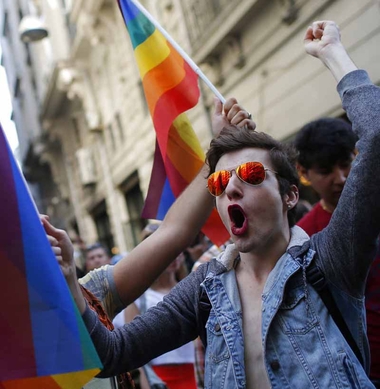Once cheering diversity, Istanbul braces for Pride Week

Istanbul (AP) — For several years, Pride Week in Istanbul attracted tens of thousands of participants, making it one of largest gatherings celebrating gay, lesbian and transgender rights and diversity in the Muslim world.
That changed suddenly two years ago, when authorities, citing security concerns, banned gay and transgender pride events and chased away shocked participants assembling at central Taksim Square with tear gas and water cannons.
The reversal, activists say, coincides with President Recep Tayyip Erdogan shedding his reformist past, taking an increasingly authoritarian line and raising Islam's profile in the officially-secular country. In his early years in office, Erdogan —then prime minister — had worked to advance minority rights as part of efforts to join the European Union.
Unlike other Muslim countries, homosexuality is not a crime in Turkey. However, lesbian, gay, transgender activists say they lack legal protections and face widespread social stigma in the nation that is heavily influenced by conservative and religious values.
The Pride Week events and parade, held in Istanbul since 2003, allowed the LGBTI community to try and break the stigma and assert rights, including demands for explicit bans on discrimination on the basis of sexual orientation and gender identity.
"The fact that the existing political power is not making the necessary changes in the constitution, and the fact that they have discourse against us might encourage people who are already (trans) phobic," said Seyhan Arman, a 37-year-old transgender woman and performer.
Deniz Sapka, a transgender woman originally from the southeastern Turkish province of Hakkari, is concerned about the lack of legal protection for her community.
"The State is not developing new politics on this and there is no legislation on our fundamental rights and freedoms. Generally the working life is problematic," said the 27-year-old who works in the non-profit sector. Sapka is not her real surname but an alias she uses to avoid recognition by family members.
Up to 100,000 people took part in a march in 2014, making it one of the largest LGBTI Pride events in a Muslim nation. The following year, authorities banned parades in a surprise move citing public order and dispersed the crowds. In 2016, the events were again banned amid a spate of deadly attacks blamed on the Islamic State group or Kurdish militants. Still, LGBTI activists tried to converge on Taksim leading to skirmishes with police.
Organizers believe that the celebrations in 2015 and 2016 were banned because they coincided with Islam's holy month of Ramadan.
Turkey's LGBTI community is braced for another confrontation with police on Trans Parade March scheduled for Sunday. The day coincides with the Muslim Eid holiday and also comes as Turkey is under a state of emergency following last year's failed coup attempt, which allows authorities to ban public gatherings.
"(The bans are) a reflection of the increasingly conservative and majoritarian policies of the government," said Murat Koylu, of the Ankara-based Koas GL, a group promoting LGBTI rights.
Last year an ultra-nationalist and conservative group, the Alperen Ocaklari, threatened to attack the celebrations if authorities did not ban them. The group, which is linked to Turkey's ultra-nationalist Great Unity Party repeated the threat this week despite an on-going court case against them brought by the LGBTI community.
Activists believe authorities are using security as an excuse to ban the parades instead of taking measures to deal with the threats instead.
The post-coup state of emergency has aggravated conditions for LGBTI individuals. The emergency powers have been used to sack more than 100,000 people from government jobs — among them thousands of academics including a large number of whom were minority rights defenders.
"The academics are people who worked on Kurdish (minority) rights, on women's issues and the LGBTI rights," Koylu said. "This has had a devastating effect. It has left the community without a voice."
In its annual human rights report on Turkey, the U.S. State Department said Turkey's government took "insufficient steps" to protect minority groups, including LGBTI individuals from threats, discrimination and violence.
"Police harassment of LGBTI persons, particularly transgender sex workers, remained common," the report said.
The Turkish government insists that there is no discrimination against individuals based on their sexual orientation, and that existing laws barring discrimination on the basis of gender, race, ethnicity or religion protect all citizens. It also insists that perpetrators of hate crimes are prosecuted.
"The violence against us has existed since the day we were born. It starts in the family, it continues at the university, in the working life," said Sapka, who describes life as a LGBTI individual in Turkey as an uphill battle. "We are people who have always experienced a state of emergency. We experience it from our birth."
By Bram Janssen and Neyran Elden, Associated Press. Copyright 2017 Associated Press. All rights reserved.
The Gayly – June 24, 2017 @ 10 a.m.





